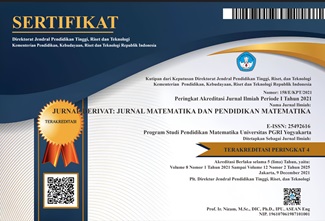Pengungkapan Efektivitas Model Pembelajaran Melalui Anava Dua Faktorial
DOI:
https://doi.org/10.31316/j.derivat.v5i2.136Abstract
This study aims to determine the effectiveness of the learning model that is influenced by the level of students' initial abilities and the combined influence (interaction effect) between the learning model and the students' initial level of ability to the students' mathematics learning outcomes. The learning model has a central function in learning, namely as a tool and a way to achieve learning goals. The type of research used in this study is quasi-experimental. The research subjects used as the subject of the trial were Yogyakarta State and Private Middle School Students. The object of this research is the students' initial abilities and learning outcomes of mathematics by using Write and Conventional Think Talk learning models. Data collection techniques used are test techniques and documentation techniques. Data were analyzed by two factors, both for initial ability test scores and learning outcome test scores and post anava test using Scheffe Test. The results of the study with α = 5% indicate: 1) The Think Talk Write learning model is more effective than the conventional learning model. (2) Learning outcomes of high-skilled students are better than students who have moderate and low initial abilities, and (3) there is no interaction between learning methods and students' initial level of ability based on learning outcomes
Keywords: Effectiveness, Think Talk Write, Anava
Abstract
This study aims to determine the effectiveness of the learning model that is influenced by the level of students' initial abilities and the combined influence (interaction effect) between the learning model and the students' initial level of ability to the students' mathematics learning outcomes. The learning model has a central function in learning, namely as a tool and a way to achieve learning goals. The type of research used in this study is a quasi-experimental. The research subjects used as the subject of the trial were Yogyakarta State and Private Middle School Students. The object of this research is the students' initial abilities and learning outcomes of mathematics by using Write and Conventional Think Talk learning models. Data collection techniques used are test techniques and documentation techniques. Data were analyzed by two factors, both for initial ability test scores and learning outcome test scores and post anava test using Scheffe Test. The results of the study with α = 5% indicate: 1) The Think Talk Write learning model is more effective than the conventional learning model. (2) Learning outcomes of high-skilled students are better than students who have moderate and low initial abilities, and (3) there is no interaction between learning methods and students' initial level of ability based on learning outcomes. Keywords: Effectiveness, Think Talk Write, AnavaDownloads
Published
Issue
Section
Citation Check
License
Authors who publish with this journal agree to the following terms:
-
Authors retain copyright and grant the journal right of first publication with the work simultaneously licensed under a Creative Commons Attribution-ShareAlike 4.0 International License that allows others to share the work with an acknowledgment of the work's authorship and initial publication in this journal.
- Authors are able to enter into separate, additional contractual arrangements for the non-exclusive distribution of the journal's published version of the work (e.g., post it to an institutional repository or publish it in a book), with an acknowledgment of its initial publication in this journal.
- Authors are permitted and encouraged to post their work online (e.g., in institutional repositories or on their website) prior to and during the submission process, as it can lead to productive exchanges, as well as earlier and greater citation of published work (See The Effect of Open Access).







